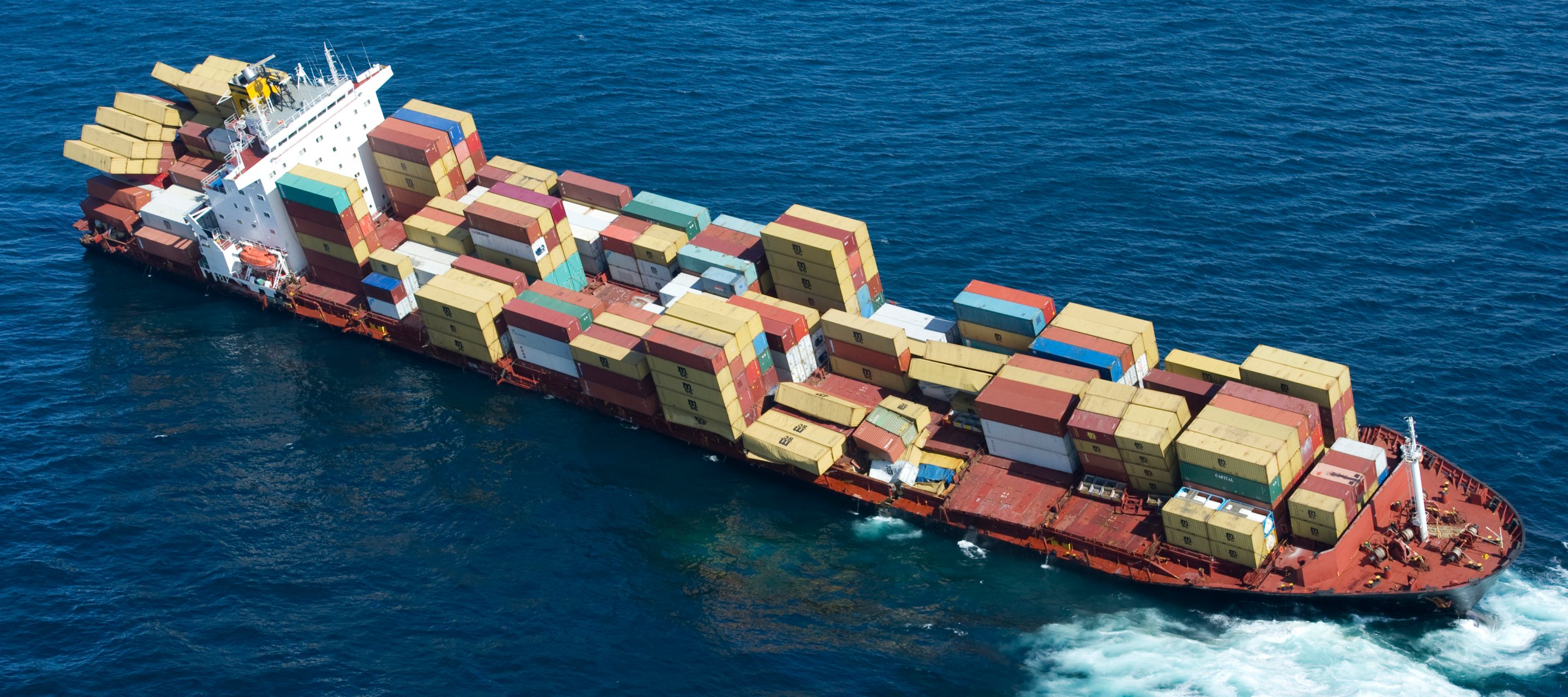Shipping disaster highlights the importance of effective corporate human rights due diligence
25 September 2025

The Southwest coastline of Kerala in India is home to an artisanal fishing community, supporting a total population of around 900,000 people who rely on fishing as a primary source of livelihood. The approximately 100,000 households inhabiting over 200 villages along the Keralan coastline face significant challenges from extreme climate events, commercial overfishing, and marine habitat degradation, impacting fish stocks and making incomes increasingly precarious. While fishing is traditionally undertaken by men, women in the community play crucial roles in processing and selling, providing steadier incomes than the highly seasonal fishing.
The region is now responding to yet another challenge causing severe harms to local communities. Earlier this year, a Liberian-flagged container vessel owned by Swiss-based shipping company MSC capsized and sank off Kerala’s coast due to a ballast-system malfunction shortly after it left Vizhinjam Port en route to Kochi. Of the 643 containers on the ship, thirteen contained hazardous materials including calcium carbide and oil. Kerala authorities issued a state-level disaster alert as hazardous debris including vast quantities of plastic pellets began washing up onshore, immediately disrupting the traditional livelihoods of local indigenous fishing communities. The ship sank 14.6 nautical miles southwest of Kochi in Indian territorial waters. In July, Keralan state authorities sued MSC for US$1.1 billion in compensation for the disaster. The Keralan High Court also ordered the arrest, seizure and detention of another MSC ship, the Akiteta II, anchored in the Vizhinjam Port until it deposits securities for the claim amount.
IHRB Senior Advisor Frances House spoke with Dr. Johnson Jament, Director of Kerala-based BlueGreen Coastal Resources, and Leno Ignatious, Youth Leader and Programme Coordinator with Kerala’s Association of Artisanal Fishers about the incident and its implications for companies.

Johnson Jament
Founder and Executive Director, Blue Green

Leno Ignatious
Youth Coordinator, Blue Green Coastal Resource Centre
Can you describe what happened in your area of Kerala after the MSC Elsa 3 sank? What environmental changes have you observed along the coast and in your fishing waters?
Huge quantities of plastic nurdles (small plastic granules used in the manufacture of plastic products) have washed up on the beaches of four districts in Kerala and Kanyakumari district of Tamil Nadu over a distance of more than 300km of coastline where Indigenous coastal communities’ livelihoods are based on artisanal fishing. In addition to the plastic pollution in the water and on the beaches, drifting containers and their contents are causing danger to artisanal fishers and damage to their fishing nets and boats. There have been limited efforts coordinated by MSC employees to collect the small plastic nurdles from the beaches in some estuary areas with locals being paid ₹900 a day (approximately US$10) but there have been no industrial clean-up efforts undertaken by MSC, the state of Kerala, or the Indian government yet.
Four months on from the disaster, and there have still been no site-wide environmental impact assessments of the disaster carried out or commissioned by MSC as far as the public is aware. The Indian Government’s Centre for Marine Living Resources and Ecology published on 19 September 2025 a first report on the ecological impact of the Elsa 3 shipwreck, indicating significant pollution and continuing leakage from the containers, all of which poses a threat to marine life and fisherman safety as well as seafood safety and food security.
How would you describe the impacts on your communities and their livelihoods?
There has been a significant loss of income to affected local communities without adequate compensation. There is no way of knowing how long this impact will continue. The Keralan government instructed local fishers not to fish for a week as precautionary measures after the disaster, and to stay clear of fishing in the area around the shipwreck. As of September 2025 no precise location of the shipwreck has been agreed by MSC, the Indian government and the Keralan government. Fish catches are lower than this time last year because of the restrictions but also potentially because of the environmental impact of the container spill. Consequently, fishers are having to travel further which costs money and time and takes them into more dangerous open waters in the monsoon season.
A Greenpeace study published on 16 September 2025 has found that Kerala fishermen are losing ₹25,000–₹30,000 (US$300-350) per month after the MSC Elsa shipwreck. Local women’s incomes are also affected as the fish catches which they sell are reduced. The study estimates that the total financial impact on livelihoods in Trivandrum district alone since the disaster could be around ₹54 lakh (over US$60,000). Further economic loss is caused by the fear of health risks as a result of contaminated fish. Economic loss assessments should also include the current and potential future impact on supply chains, including Keralan seafood export companies and processing companies.
What has been the response from MSC, the Keralan state authorities and the Indian government? Do you feel this has been adequate compensation/remedy?
The Association of Artisanal Fishers in Kerala claim that any compensation they have received is wholly inadequate and in no way makes up for the impact of their loss of livelihood. They estimate approximately 100,000 Indigenous fisher families have lost critical income since the ship sank.
In the immediate aftermath of the disaster, each family in the key affected districts in Kerala was given ₹1000 (approximately US$11) plus 6kg of rice by way of compensation. Neither the Indian government nor MSC has provided any form of compensation to date.
The Keralan government has demanded ₹9,531crore ($1.08 billion USD) in compensation from MSC for supporting fisher families, environmental damage, pollution and clean-up costs. MSC continues to claim that there is no visible damage but have still not released any environmental impact assessment studies of either the shipwreck itself or the spilled and drifting containers to verify this claim.
In the absence of any compensation payment by MSC, the Keralan High Court used its powers under the Admiralty Act 2017 to arrest another MSC vessel in port, to be released only once adequate compensation has been paid, also issuing an interim order for ₹1,262.6 crore ($142.5 million USD) compensation on 25 September 2025. The Indian government has not demanded any compensation from MSC to date.
The Association of Artisanal Fishers and several other entities are planning to move legally for further responses either through the Keralan High Court or Kerala Human Rights Commission to ask for a government response around compensation for loss of livelihood and for a thorough independent environmental assessment to properly gauge the medium and longer-term impact of the spill on their fishing waters.
What have been the opportunities for engagement by the duty-bearers (the company, the Keralan and Indian governments) with the rights holders (the affected communities)? Has there been any direct dialogue?
The Keralan state government has conducted meetings with scientific and research institutions, expert panels, government agencies, union leaders and local political party representatives but there has been no formal dialogue or consultation process by MSC or Indian government authorities with affected community leaders or fishers themselves to discuss impact on livelihoods, small boat fishing safety, food security, adequate compensation, nor to communicate about any proposed environmental impact assessments or clean-up management plans. This is another example of marginalised Indigenous communities not having a voice even where their rights are being directly infringed.
What action would you like to see taken in the short-term — both to clean up the environmental harm and to restore livelihoods, including adequate compensation?
Local fisher communities are calling for the following:
- Greater transparency by MSC in terms of the exact site of the shipwreck and data around the containers;
- A thorough independent social and environmental impact assessment to be undertaken and published, including an assessment of human health risks and impacts due to exposure to chemicals and other debris;
- Adequate compensation provided for fisher families calculated on the loss of catch since the ship sank compared to average catches in the same period over the previous few years and taking into account future income losses due to contamination.
- Meaningful engagement by the Keralan government with impacted communities to restore trust;
- Clarity as to what is the extent of the Indian government’s duties vis-à-vis the Keralan state government to protect its citizens’ rights given the ship sank in Indian Union territorial waters but the impacts are on Keralan state fisher communities;
- Transparency by MSC with regard to its responsibilities, liabilities and role in providing remedy to affected rights-holders.
- Robust risk management and emergency preparedness plans by MSC and other shipping companies to reduce the risk of similar accidents in future. Local fishers have long warned of the risk of major container ship traffic, especially those carrying hazardous materials, to Vizhinjam port in the SW monsoon season due to rough seas.
- Removal of underwater containers and updates on the status of the oil spill containment and clean-up and debris salvage.
What accountability measures and access to remedy would you like to see in place to better protect the rights of your fishing communities?
Companies such as MSC need to fulfil their commitments under the UN Guiding Principles and other international conventions or commitments to respect human rights and provide access to effective remedy. Likewise, governments at state and federal level need to uphold their duty to protect citizens’ rights and ensure adequate mechanisms for access to effective remedy.
In the aftermath of the MSC Elsa 3 disaster, affected fisher communities are demanding:
- Beach clean-up and restoration
- Livelihood protection and fair compensation
- Justice to protect customary fishing areas from ocean grab
Traditional fisher communities are calling for real corporate and governmental accountability, to include:
- An independent grievance mechanism which includes representation by fishers who have deep traditional and scientific ocean knowledge;
- A fast-track legal system at state-level which requires companies to undertake and publish environmental impact assessments and to demonstrate mechanisms for accountability, transparency and remedy, including compensation for loss of livelihood;
- Legally enforceable requirements for robust due diligence and transparency by companies and government agencies with regard to environmental and human rights impact of both developments and accidents;
- Independent scientific studies to be included in environmental impact assessments.
- Representatives from marginalised fisher communities must be at the table in decision-making along with government, civil society and private sector actors with regard to disaster avoidance, preparedness, mitigation, response.
Beyond the MSC Elsa 3 incident, what mechanisms would you like to see in place to support greater dialogue between indigenous coastal communities in Kerala and ocean industries such as shipping, port development and commercial fishing?
The Association of Artisanal Fishers and the BlueGreen Coastal Resources are calling for a multi-stakeholder ‘Coastal Justice and Dialogue Council’ to undertake marine spatial planning. This council should include Indian and Keralan government representatives, marine scientists, civil society organisations and fishing community representatives. The purpose of the council would be to minimise the risk of adverse impacts on local coastal communities from shipping, port development activities and commercial fishing. It would need to be community-led and transparent to build trust.
The case of the MSC Elsa 3 highlights the importance of companies fulfilling their responsibilities to respect human rights, including undertaking due diligence, assessing, preventing and mitigating risks, and providing timely access to remedy where rights-holders are negatively impacted by corporate actions. Meaningful engagement with affected stakeholders is a crucial part of this process and has been lacking in this case to date. In parallel, the duties of the government to protect human rights are critical, including through provision of adequate legal frameworks and effective remedies, especially where both state-level and national jurisdictions are at play. In the shipping sector, this is further complicated by jurisdictions of flag and port states, highlighting the critical importance of robust due diligence, transparency and accountability mechanisms to minimise risks of adverse impacts to already marginalised coastal communities.
IHRB has been working for many years with a number of the world’s leading shipping companies, including MSC, to promote seafarer welfare. We convene an industry-wide Action Group on Responsible Recruitment, seeking to work collectively to eliminate exploitative practices such as the charging of illegal recruitment fees by crewing agencies.
Beyond seafarer rights, the impacts of a number of ocean industries on marginalised coastal livelihoods is a critical challenge requiring joint action. Too often, shipping companies do not engage directly with impacted coastal communities in their human rights due diligence or environmental and social impact assessments.
We’re committed to convening key stakeholders - including companies and representatives of impacted artisanal fishing communities - to forge understanding and appropriate remediation, and to strengthen human rights due diligence and policies in future.




